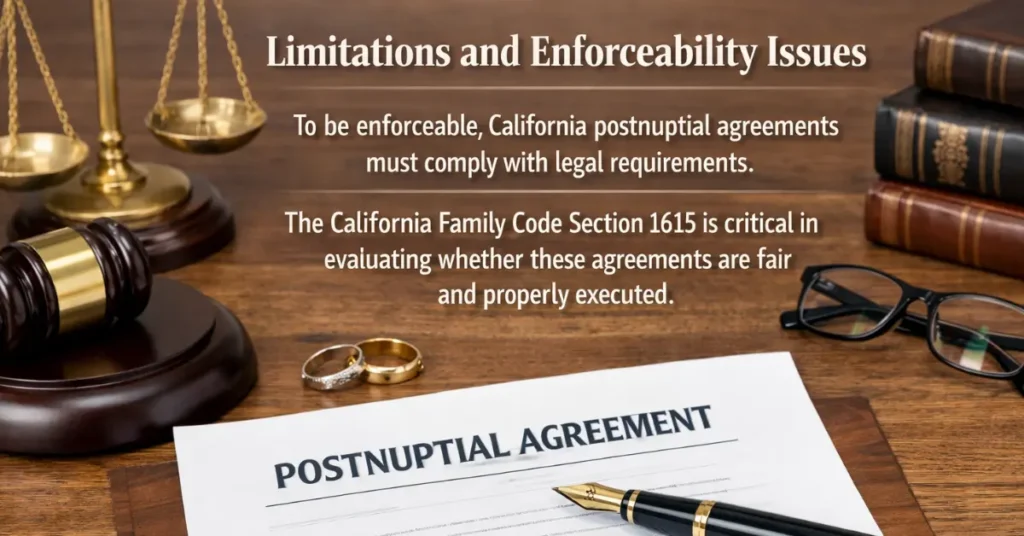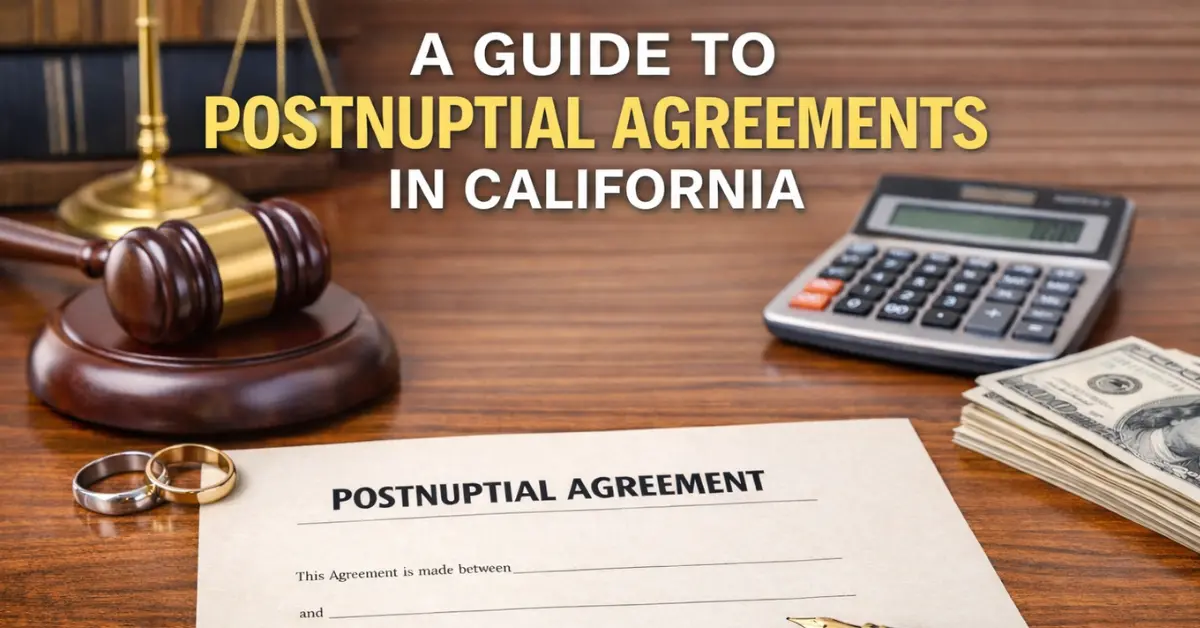A postnuptial agreement is a legal document designed to outline the financial rights and obligations of each spouse after marriage. Unlike prenuptial agreements, which couples sign before they get married, postnuptial agreements are entered into during the marriage.
In California, these contracts are becoming increasingly popular among married couples who wish to clarify their financial arrangements, divide assets, or manage other specific issues that could arise during the marriage.
Postnuptial agreements offer an important distinction from prenuptial contracts, as they allow married couples the flexibility to adapt their financial agreements in response to changes in their relationship, economic circumstances, or personal goals.
While both agreements aim to protect the financial interests of both parties, a postnuptial agreement provides more flexibility, enabling couples to make informed decisions about their marital assets during the course of their marriage.
Couples in California may consider this type of contract for various reasons, including managing financial responsibilities better, handling unexpected life events, and ensuring equitable treatment of both parties.
Legal Conditions in California for a Lawful Postnuptial Agreement
To ensure a postnuptial agreement is legally binding and enforceable, California mandates several essential requirements. Firstly, California law mandates that such agreements must be in writing and signed by both parties.
This written format solidifies the terms of the contract and establishes clarity and enforceability in the eyes of the court.
Moreover, both spouses must voluntarily consent to the terms without any coercion. Full disclosure of all assets, liabilities, and financial interests is mandatory for a valid agreement.
Failing to disclose financial assets accurately could render the agreement unenforceable. It’s crucial to ensure the terms are fair and reasonable, as California courts evaluate the fairness of agreements, especially if they seem one-sided.
Both parties should have legal representation to understand their rights, responsibilities, and the contract’s impact on their individual and joint assets. Having independent attorneys review the terms ensures that the agreement is equitable, transparent, and protects the rights of both parties involved.

Reasons to Consider a Postnuptial Agreement
A postnuptial agreement serves as a practical tool to manage financial expectations, address changes in life circumstances, and protect individual assets. Many couples opt for these contracts for various reasons:
- Managing Financial Expectations and Responsibilities
By setting clear financial boundaries, couples can avoid misunderstandings related to asset division and financial responsibilities. This is particularly helpful in marriages where one partner earns significantly more or holds more assets than the other.
- Addressing Significant Life Changes
Certain life events, such as receiving an inheritance, changing careers, or having children, often prompt couples to reconsider their financial arrangements. A postnuptial agreement allows couples to adapt their financial responsibilities to account for these changes, ensuring that each partner’s contributions are recognized and safeguarded.
- Protecting Individual and Marital Assets
Postnuptial agreements are commonly used to protect each spouse’s individual assets and wealth accumulated before or after marriage. They help couples define separate and marital property, providing a fair way to allocate assets and liabilities in case of separation or divorce.
What Can Be Included in a Postnuptial Agreement?
A postnuptial agreement can cover a wide range of financial arrangements and asset divisions. Frequently covered are some of the primary points:
- Division of Assets and Debts
These agreements allow couples to clearly define how assets and debts will be divided, including retirement accounts, investment properties, and individual debts. This section can also specify what each spouse will be responsible for in case of a marital dissolution.
- Spousal Support Terms
In the case of a separation or divorce, postnuptial agreements may provide provisions for spousal support, sometimes known as alimony. This ensures that both parties understand the expectations around financial support and have a predetermined plan in place.
- Exclusions
Postnuptial agreements can only cover certain things. Child custody and child support cannot be included, as these matters are determined based on the best interests of the child at the time of separation, not by a pre-existing contract.
By establishing these terms in a postnuptial agreement, couples can better manage their financial futures, reduce potential disputes, and protect their personal interests.
Having a well-structured postnuptial agreement can help California couples navigate changes in their marriage with transparency and foresight.

Limitations and Enforceability Issues
To be enforceable, California postnuptial agreements must comply with legal requirements. The California Family Code Section 1615 is critical in evaluating whether these agreements are fair and properly executed.
Issues such as coercion, fraud, lack of proper financial disclosure, or involuntary consent can render these agreements invalid. Courts closely examine the fairness of postnuptial contracts and whether both parties entered them without undue pressure.
Fiduciary duties, as outlined in Section 721, further require spouses to fully disclose financial details, ensuring neither partner is at a disadvantage.
Challenges often arise in California courts regarding proof of transparency, mutual consent, and absence of coercion, which could all jeopardize the enforceability of the agreement.
How to Create a Postnuptial Agreement in California
Creating a valid postnuptial agreement involves several crucial steps:
- Consultation with a Family Law Attorney
Engaging an attorney ensures that the agreement adheres to California laws and both partners’ rights are protected.
- Financial Disclosure
Each spouse must provide a complete and honest disclosure of assets, debts, and financial obligations. This transparency is essential for the agreement to be legally binding.
- Negotiation and Drafting
After disclosure, the terms of asset division, spousal support, and other financial matters are negotiated and outlined in writing.
- Signing the Agreement
Both spouses sign the agreement voluntarily, often in the presence of legal counsel. The agreement is then legally binding, though ongoing reviews are recommended, particularly after significant financial changes or life events.
Frequently Asked Questions (FAQ)
Can postnuptial agreements be challenged?
Yes, they can be challenged if found to be unjust, coerced, or lacking full disclosure. Courts examine the intent and execution of the agreement to ensure fairness.
Are postnuptial agreements valid during divorce?
When properly executed, postnuptial agreements outline asset and debt division, which is generally honored by the court in divorce proceedings.
Is a lawyer necessary?
While not legally required, consulting a lawyer is advisable to ensure the agreement meets legal standards, protecting both parties.
Conclusion
Postnuptial agreements provide a valuable tool for protecting assets, defining financial responsibilities, and supporting marital stability. For many California couples, these agreements foster clarity and trust by safeguarding financial interests and establishing transparent expectations.
For the agreement to hold, legal guidance and honest disclosure are key. Couples considering a postnuptial contract should seek experienced legal advice to ensure it is fair, valid, and enforceable under California law.




